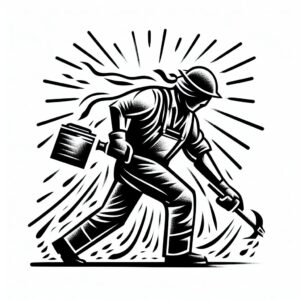Joint Winner of The Letter Review Prize for Nonfiction
I
The marina, with its flamboyant yachts and high rise buildings, is quiet at this hour. The hundreds of cranes are immobile. The night shift has ended and will soon be replaced with the day shift. I start my walk before dawn now because the heat in Dubai is unbearable. I will suffocate if I can’t get some “real” air in me and not just air conditioning. I will spend the rest of the day indoors, at home, in the car, or in a shopping mall.
II
The alarm is set for 5 am. There is still a whiff of freshness when I begin my daily constitutional around the marina. The tired laborers are curled up, two or three to a cardboard mat, a brick under each head, work boots at the foot of a makeshift bed. The laborers look colorful in their matching orange or blue clothes, like foil wrapped candy in a box. It is easy to miss the cracks in their faces and the dust on their clothes. Bright colors hide poverty, as does makeup on a lined face. The uniform is distracting. The supply of laborers is endless. The construction never stops.
III
I park my car in the only spot not in the sun, but the steering wheel will burn my hands when I come back in an hour. I don’t know that I have taken the laborers’ rest area. They are now on their lunch break and have completely surrounded my car, using every corner available, taking full possession of the coveted shade. My car stands center piece like a gigantic worshipped queen bee. The laborers sit on the sand on dissected cartons. Soon, they will lie down and sleep until their work shift resumes. The Ruler of Dubai has decreed that the laborers must be allowed to rest for three hours during the hottest time of the day, but not where they would rest.
I am ashamed for my car. I don’t look for shade again.
IV
They sit three to a row in the bus; the third one with only half a seat. Their cheerful work clothes are no longer bright. The buses are not air conditioned. They used to ride in cattle trucks, but the sight disturbed tourists.
V
We are driving in the desert on our way to Oman. He is alone digging on the side of the road. I open the window. The air stings my face. The temperature gauge registers 48 degrees celsius. I give him the only thing I can think of – a bottle of water. Our eyes lock for a second. His despair and loneliness still accompany me.
VI
The Mercedes in front of me stops at the traffic light. The window rolls down, the arm of the white Emirati dishdasha appears and takes out a tray of orange bottled drinks and bread buns. The driver calls over the laborers. I have witnessed an anonymous act of kindness; like a mother to her baby, the giving is the reward.
VII
The laborer sends most of his salary to his home country. The clutch bag I buy today can feed his family for a month.
VIII
The laborers have not been paid for three months. They have no money to send home. They take over Sheikh Zayed Road in protest and the traffic is backed all the way to Ibn Battuta Mall. The Ruler of Dubai intervenes. Striking is illegal. The work visas are revoked and the laborers are expelled. I don’t know whether they receive their salaries, I don’t know how the story ends.
Jeannie Harrison writes flash creative nonfiction. Born in San Francisco, she grew up in France and London, and attended French schools until age 18. She has a BA in Philosophy and German, and an MBA. She immigrated to Israel in 1988. She started writing seriously in 2005, while living in Dubai with her partner and five year old twins. Their next posting was Miami, Florida in 2008 where her third child joined the family in 2010. In 2015, she moved to Senegal, where her partner was the Israeli Ambassador. He is now her former partner. Jeannie lives in Israel and speaks French, English and Hebrew. Her stories are based solely on her life.

